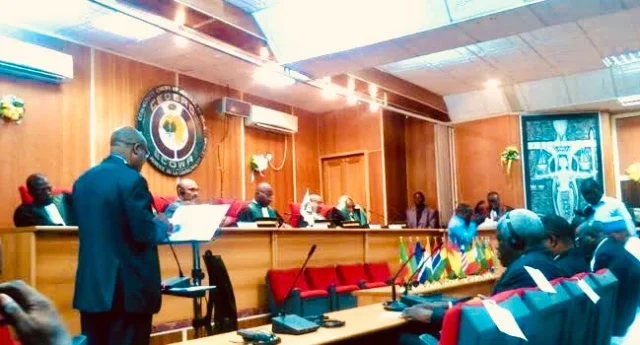The Vice President, Commission for the Economic Community of West African States (ECOWAS Commission), Damtien Larbli Tchintchibidja, on Sunday, disclosed that the official exit of Niger, Mali, and Burkina Faso from the regional bloc has taught the leadership of the community to speed up necessary reforms needed to adapt to the new realities.
Speaking at the opening of the 37th Ordinary Meeting of the ECOWAS Administration and Finance Committee, holding in Abuja, she appealed to member states’ sense of responsibility towards such reforms.
Noting that ECOWAS is currently going through an existential crisis and at a crossroads, the Vice President called for a strong capacity to overcome the obstacles that stand in its way of integration.
She said, “One of the lessons learnt from the commemoration of our 50th anniversary and those learnt from the departure of the three Member States is that it is essential and imperative for us to speed up the institutional, organisational, political, and security reforms needed in order to adapt to the new realities.”
According to her, the region can only witness development when there is peace and stability, stressing that its strength lies in unity, solidarity, and fraternity.
She said, “In such circumstances, we must sit down together, pose and examine the problems and challenges facing us without complacency, and together redouble our efforts to find appropriate solutions.
“It is in this spirit that I am pleased to announce the forthcoming organisation, in accordance with the decisions of the Heads of State and Government, of a Summit on the Future of the Community, at which your contribution will be highly appreciated.
“Prior consultations will be organised, including with young people and women, to take into account all the needs for the future of the Community.”
The three-day forum is to evaluate the mid-term implementation of the decisions, programmes, projects, and activities of the Community institutions as well as the official withdrawal of three of its member states.
It will also serve to discuss the difficult financial situation of the Community as well as the state of recruitment within the institutions.
Commending the committee for approving the activities and budget of the 50th anniversary of the Commission, she said it was a testament to the committee’s commitment to achieving the objectives of the organisation.
“You are the guardians of the rules and procedures that govern the Community institutions. In addition to analysing and evaluating the implementation of Community programmes, projects, and activities, you also play a supervisory, advisory, and performance monitoring role,” she said.
Speaking, the Commissioner, Internal Service, Professor Nazifi A. Darma, feared that the new world order created by the United States of America and the consequent withdrawal of USAID assistance across most West African countries is likely to be reciprocated by other development partners.
He therefore urged the finance and administrative experts to think of how best to intensify effective utilization of resources internally within the institutions and design a contingency strategy of doing away with any foreign development.
In his opening remarks, Chairman, Administration and Finance Committee, ECOWAS, Amb. Olawale Emmanuel Awe, expressed the need for remaining member states to pay their levies and dues for effective running of the Commission’s programmes and activities, as well as block the vacuum created by the exit of three members.
He said: “Member states are expected to comply with the payments of their levies, especially now that Burkina Faso, Niger, and Mali have withdrawn their membership from ECOWAS, to enable the region carry out its programmes for the benefit of its citizens.”
Awe also emphasised the need to address staffing gaps within ECOWAS institutions and the need for merit, compassion, and regional inclusion.
“Regarding the staffing of ECOWAS institutions, it has become more imperative with the exit of the three countries that the Commission needs to work on the process of planning and filling the available vacancies in the institution,” he added.







